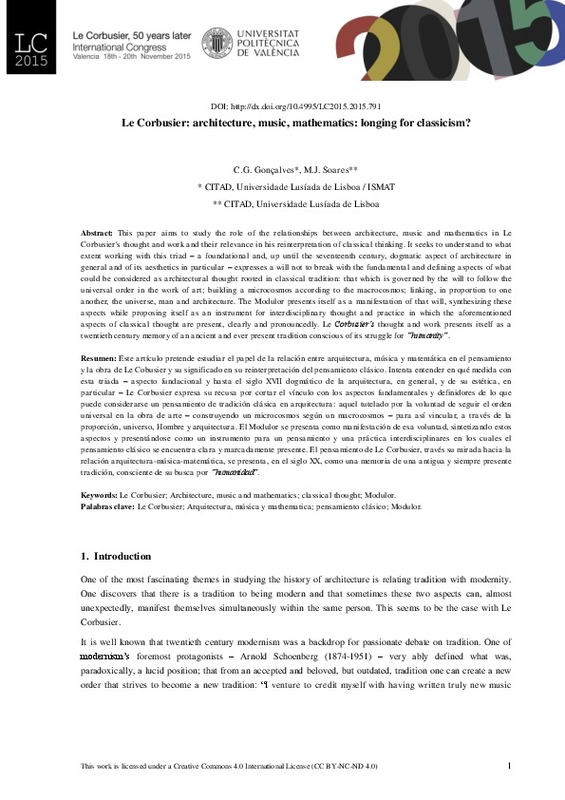JavaScript is disabled for your browser. Some features of this site may not work without it.
Buscar en RiuNet
Listar
Mi cuenta
Estadísticas
Ayuda RiuNet
Admin. UPV
Le Corbusier: architecture, music, mathematics: longing for classicism?
Mostrar el registro sencillo del ítem
Ficheros en el ítem
| dc.contributor.author | Gonçalves, Clara
|
es_ES |
| dc.contributor.author | Soares, Maria João
|
es_ES |
| dc.date.accessioned | 2017-09-14T06:55:11Z | |
| dc.date.available | 2017-09-14T06:55:11Z | |
| dc.date.issued | 2016-03-03 | |
| dc.identifier.isbn | 9788490483732 | |
| dc.identifier.uri | http://hdl.handle.net/10251/87258 | |
| dc.description.abstract | [EN] This paper aims to study the role of the relationships between architecture, music and mathematics in Le Corbusier's thought and work and their relevance in his reinterpretation of classical thinking. It seeks to understand to what extent working with this triad – a foundational and, up until the seventeenth century, dogmatic aspect of architecture in general and of its aesthetics in particular – expresses a will not to break with the fundamental and defining aspects of what could be considered as architectural thought rooted in classical tradition: that which is governed by the will to follow the universal order in the work of art; building a microcosmos according to the macrocosmos; linking, in proportion to one another, the universe, man and architecture. The Modulor presents itself as a manifestation of that will, synthesizing these aspects while proposing itself as an instrument for interdisciplinary thought and practice in which the aforementioned aspects of classical thought are present, clearly and pronouncedly. Le Corbusier’s thought and work presents itself as a twentieth century memory of an ancient and ever present tradition conscious of its struggle for “humanity” | es_ES |
| dc.description.abstract | [ES] Este artículo pretende estudiar el papel de la relación entre arquitectura, música y matemática en el pensamiento y la obra de Le Cobusier y su significado en su reinterpretación del pensamiento clásico. Intenta entender en qué medida con esta triada – aspecto fundacional y hasta el siglo XVII dogmático de la arquitectura, en general, y de su estética, en particular – Le Corbusier expresa su recusa por cortar el vínculo con los aspectos fundamentales y definidores de lo que puede considerarse un pensamiento de tradición clásica en arquitectura: aquel tutelado por la voluntad de seguir el orden universal en la obra de arte – construyendo un microcosmos según un macrocosmos – para así vincular, a través de la proporción, universo, Hombre y arquitectura. El Modulor se presenta como manifestación de esa voluntad, sintetizando estos aspectos y presentándose como un instrumento para un pensamiento y una práctica interdisciplinares en los cuales el pensamiento clásico se encuentra clara y marcadamente presente. El pensamiento de Le Corbusier, través su mirada hacia la relación arquitectura-música-matemática, se presenta, en el siglo XX, como una memoria de una antigua y siempre presente tradición, consciente de su busca por “humanidad” | es_ES |
| dc.language | Inglés | es_ES |
| dc.publisher | Editorial Universitat Politècnica de València | es_ES |
| dc.relation.ispartof | LE CORBUSIER. 50 AÑOS DESPUÉS | es_ES |
| dc.rights | Reconocimiento - No comercial - Sin obra derivada (by-nc-nd) | es_ES |
| dc.subject | architecture | es_ES |
| dc.subject | le corbusier | es_ES |
| dc.subject | modern movement | es_ES |
| dc.title | Le Corbusier: architecture, music, mathematics: longing for classicism? | es_ES |
| dc.type | Capítulo de libro | es_ES |
| dc.type | Comunicación en congreso | es_ES |
| dc.identifier.doi | 10.4995/LC2015.2015.791 | |
| dc.rights.accessRights | Abierto | es_ES |
| dc.description.bibliographicCitation | Gonçalves, C.; Soares, MJ. (2016). Le Corbusier: architecture, music, mathematics: longing for classicism?. En LE CORBUSIER. 50 AÑOS DESPUÉS. Editorial Universitat Politècnica de València. 844-861. https://doi.org/10.4995/LC2015.2015.791 | es_ES |
| dc.description.accrualMethod | OCS | es_ES |
| dc.relation.conferencename | LC2015 - Le Corbusier, 50 years later | es_ES |
| dc.relation.conferencedate | November 18-20,2015 | es_ES |
| dc.relation.conferenceplace | Valencia, Spain | es_ES |
| dc.relation.publisherversion | http://ocs.editorial.upv.es/index.php/LC2015/LC2015/paper/view/791 | es_ES |
| dc.description.upvformatpinicio | 844 | es_ES |
| dc.description.upvformatpfin | 861 | es_ES |
| dc.type.version | info:eu-repo/semantics/publishedVersion | es_ES |
| dc.relation.pasarela | OCS\791 | es_ES |








